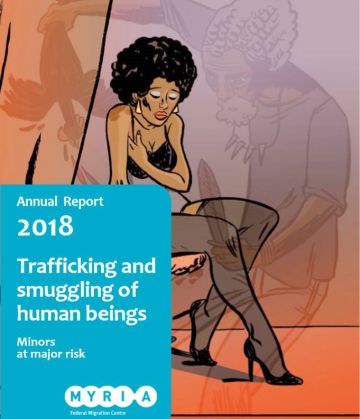2018 Annual report trafficking and smuggling of human beings
Minors at major risk
Whether they are the subject of sexual exploitation, labour exploitation or forced criminal activities, these child victims of human trafficking have very different profiles. Their detection by players in the field is problematical: many of them are insufficiently informed about human trafficking indicators. Consequently, Myria would like to see the intensification and diversification of training for frontline players, judges, guardians and youth support services.
Furthermore, few child trafficking victims use the specific procedure for granting residence to victims of trafficking which, as is the case for adults, requires collaboration with the law. In addition, the reception of these minors isn't sufficiently adapted. They must be placed in secure structures, such as the Esperanto centre, which is an example of good practice that should encouraged and consolidated.
Myria would also like the Interdepartmental Policy Coordination Unit – a Belgian coordination body - to set up an independent group of experts. It would be responsible for formulating concrete proposals with a view to solving detection, reception and residence problems concerning these child victims.
Myria's report focuses on a particularly vulnerable group of victims: underage Nigerian girls recruited by traffickers in their country of origin with a view to their exploitation in Europe in prostitution in windows and on the street. Belgium is one of the major destination countries.
According to the IOM (International Organisation for Migration), 3,000 underage Nigerian girls arrived in the EU (European Union) in 2016 via the perilous Libyan route. And yet, the same year in Belgium, only 20 unaccompanied Nigerian minors were referred to the guardianship service. The detection of these minors is also problematic. These young Nigerian girls without papers are obliged by their pimp to say that they are adults and are manipulated through voodoo rituals.
Usually, there is only one chance to save a young girl during an interception before she is 'moved on' by her exploiters. 'Breaking' the voodoo spells is a crucial element. The procedure requires an approach that inspires trust in the victim, and this requires in-depth knowledge of the phenomenon. Within this framework, in-depth awareness among all frontline players is essential. When they intercept a Nigerian victim, they must immediately involve the police's specialised human trafficking unit, which needs to have greater investigative capacities.
Minors at major risk, Annual report 2018 Trafficking and smuggling of human beings
The situation is extremely worrying. In terms of the detection, reception and support of child victims of human trafficking, Belgium still has a long way to go. According to the findings of Myria, the Federal Migration Centre, Nigerian minors are a particularly vulnerable group.
Since 2014, Myria has been part of the National Rapporteur on Human Trafficking mechanism, serving as its independent component, as well as the Interdepartmental Coordination Unit (which reports on behalf of the Belgian State). Within this framework, it analyses the situation and formulates recommendations. Myria publishes an independent, public annual report in which it assesses the evolution and the results of the Belgian authorities' fight against the trafficking and smuggling of human beings. It it sent to the government and parliament. This critical report provides an impetus and valuable support to the players in the field.
The Belgian anti-smuggling model, which focuses on counteracting the smugglers, has been quoted as an example for more than 20 years. This approach relies on the collection of proof (especially being caught red-handed in parking areas) and a human approach to the victims. It is also based on collaboration between smuggling victims and the law, within the framework of the status of victim of human smuggling. These victims' statements are sometimes responsible for opening major smuggling cases. However, this model risks being undermined if the police's limited resources are only devoted to wide-scale checks (for instance, in public transport). These types of actions are more a case of hunting down illegal immigrants, where maintaining order and combating disturbances are predominant. What is more, such an approach is likely to reinforce the illegal migrants' feeling of loyalty towards their smugglers.
Myria is therefore in favour of a human approach to victims of smuggling, that can bring added value to an investigation against smugglers. Myria is also calling for greater international cooperation in order to dry up the smuggling networks' financial flows.
Since 2014, Myria has been part of the National Rapporteur on Human Trafficking mechanism, serving as its independent component, as well as the Interdepartmental Coordination Unit (which reports on behalf of the Belgian State). In this role, Myria is entitled to take legal action. The board of directors regularly votes to file a civil suit in cases of human trafficking and human smuggling. This allows Myria to share its expertise with the judiciary and other stakeholders, and to acquire thorough knowledge of the phenomenon. Every year, Myria compiles an independent public assessment report describing the developments and results in the fight against the international trade in human beings. It also coordinates three specialised reception centres for trafficking victims.

